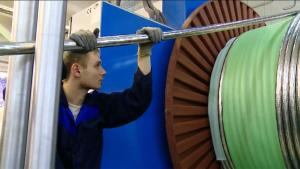Where conductors are born
13 Jul 2012
-
Alexander Petrov, Russian Domestic Agency
Specialists at VNIIKP in Podolsk, Russia have produced a 760-metre niobium-tin (Nb3Sn) cable—the second product of this kind manufactured in Russia.
Manufacturing the toroidal field conductors for the ITER magnet system is a sophisticated, multistage process. Early this year, specialists at the All-Russian Cable Scientific Research and Development Institute (VNIIKP) in Podolsk, Russia twisted supraconductor strands into a 760-metre niobium-tin (Nb3Sn) cable—the second product of this kind manufactured in Russia.
At the end of February, at the High Energy Physics Institute in Protvino, this cable was pulled through a stainless steel jacket that had been assembled on site. The process involved the most advanced Russian technology and knowhow. The jacket itself—reaching nearly a kilometre in length and composed of more than 70 tubes welded together by gas tungsten-arc welding technology—was exposed to triple testing of the weld seams' quality and reliability.
During the next stage in the process, the jacketed cable, called a conductor, was compacted and spooled into a solenoid measuring four metres in diameter. Following vacuum and hydraulic tests at the Kurchatov Institute in Moscow, the conductor will be shipped to Europe.
Follow this link to a 10-minute video in English that will bring you inside the Russian factories involved with toroidal field conductor manufacturing for ITER.
Click here to see the video in Russian.


